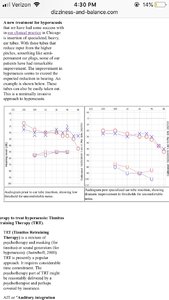- Apr 11, 2018
- 112
- Tinnitus Since
- May 2017
- Cause of Tinnitus
- Bars/nightclubs/MRI
Hey everyone,
I came across a surgery for hyperacusis. It's a semi permanent (super expensive) ear plug that completely blocks high frequency sounds. Supposedly if I change my mind I can have surgery again and have them removed.
My hyperacusis gets worse with high frequency sounds so I feel like this could help me at least stop the deterioration of my ears.
Yes I know many of you are advocates of TRT (and I think TRT is very good at reminding us to keep up our tolerance of noises in general—-I agree this is crucial) but I don't believe I should keep exposing myself to certain high frequency noises (such as found in pink noise) since these continue to ruin my ears.
That is the case at least for MY hyperacusis. If TRT worked for you, I'm genuinely happy for you. I'm just talking to the people who's hyperacusis was not helped by TRT.
There is a study by Harvard that was recently done that shows that noises that shouldn't harm the rat test subjects (well below 80 decibels)....actually do continue to kill their hair cells once they have hyperacusis. TRT says the complete opposite. That certain noise decibels can't hurt us. I hypothesize that TRT is half right. Our H can and will become worse if we overprotect from all noises. But I think high frequency noises can harm us. That's just my theory though.
The doctor has not agreed to the surgery yet but I thought I would share my progress in fighting for the surgery and so forth.
All the best,
Layla
I came across a surgery for hyperacusis. It's a semi permanent (super expensive) ear plug that completely blocks high frequency sounds. Supposedly if I change my mind I can have surgery again and have them removed.
My hyperacusis gets worse with high frequency sounds so I feel like this could help me at least stop the deterioration of my ears.
Yes I know many of you are advocates of TRT (and I think TRT is very good at reminding us to keep up our tolerance of noises in general—-I agree this is crucial) but I don't believe I should keep exposing myself to certain high frequency noises (such as found in pink noise) since these continue to ruin my ears.
That is the case at least for MY hyperacusis. If TRT worked for you, I'm genuinely happy for you. I'm just talking to the people who's hyperacusis was not helped by TRT.
There is a study by Harvard that was recently done that shows that noises that shouldn't harm the rat test subjects (well below 80 decibels)....actually do continue to kill their hair cells once they have hyperacusis. TRT says the complete opposite. That certain noise decibels can't hurt us. I hypothesize that TRT is half right. Our H can and will become worse if we overprotect from all noises. But I think high frequency noises can harm us. That's just my theory though.
The doctor has not agreed to the surgery yet but I thought I would share my progress in fighting for the surgery and so forth.
All the best,
Layla


 Member
Member